#me reading an essay on the materialistic conception of history: this reminds me of my blorbo :3
Text



#comparatives#tlt quotes#me reading an essay on the materialistic conception of history: this reminds me of my blorbo :3#harrow#[for legal purposes this is a joke]#elle tlt posting#tlt
93 notes
·
View notes
Text
Dialectic Identity? Thoughts on Fozzer, the Page of Heart:
OK this is gonna be shorter than Marvus obvs but Fozzer DID give me a good amount to think about, so here goes
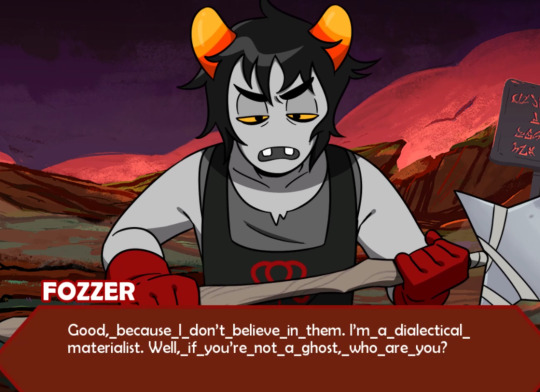
Fozzer outright identifying as a dialectical materialist is exciting for a couple reasons. There’s a lot one could say about dialectics and Paradox Space in general (I’ve been trying to write that script for about a year) but here I want to focus on the Materialist half of that, because it immediately reminded me a lot of @arrghus’ idea of the notional/material divide between aspects.
Ever since the Extended Zodiac, we’ve been wondering if the way the Aspect wheel is laid out might suggest some relationships between Aspects, either original to Homestuck, mirroring the relationships the Signs share in the traditional Zodiac wheel, or some combination of both.
Arrghus’ essay series proposes a model for how those relationships might work, at least in part. I’d suggest checking it out for the full picture, but here I want to focus on the divide I find clearest and most compelling: That between the Ideal/Notional Aspects and the Material/Physical ones.

The gist is this: The top five Aspects (Mind, Hope, Breath, Life, and Light) are more closely aligned with the World of Ideas, and so those bound to them tend to be more concerned with the ideal, abstract, and imaginary. The bottom five (Void, Doom, Blood, Rage, and Heart) are more closely tied to the material, physical, and real.
If you’ve seen my prior writing on Homestuck, you might note that this dovetails easily with Gnosticism’s old cosmology of reality as divided between an imaginary world of Light and a physical world of Darkness. That said, this isn’t a hard binary--Blood obviously refers to some concepts as well as physical experience, and Breath obviously links to some things that happen in physicality, even if those elements are by definition elusive and insubstantial.
Space and Time are an even split, as much conceptual law to be deciphered as they are physical element of reality to be experienced. It could well be that this reflects most strongly in the perspectives those Bound to each Aspect are given to, as opposed to an underlying reality of the Aspects themselves, and in any case all twelve Aspects are necessary to describe a full picture of reality.
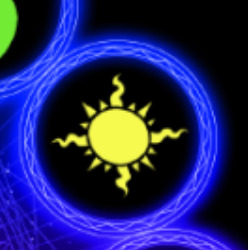
One of the most exciting possibilities this model raises for me is the idea of Aspect “Mirroring”, which is essentially a different kind of relationship Aspects can have. Aspects that are Mirror each other vertically, for example, might express the same ideas through the filter of the Ideal vs. the Material--reflecting the hermetic/magical principle of “As above, so below”.
Heart and Light are a pretty good way to express the relationship between vertically mirrored Aspects, as it turns out. Consider:
In Gnosticism, “Light” refers to directly to Information/Ideas, as the world of Light is the world of the imaginary. This is where “Platonic Ideals” live--the perfect imaginary version of any object, from which all physical manifestations of that object are derived.
Humanity gains the ability to access this world, the self-aware conciousness necessary to think, when the Goddess of Wisdom Sophia descends from that realm and imbues us with her Light--the light of curiosity, of wisdom, of the power to know. The light of the soul.
In this way, we can think of the Soul--the Heart--of living beings as their inner Light, expressed throughout their lives in the realm of physicality. And we can think of Light/Ideas as abstract concepts, that can only enter reality proper through the doorways created by the self-expression of individuals, as enabled by their soul.

There are a lot of ideas and concepts that Dirk’s soul seems consistently inclined to express onto reality. The shades, the concept of “being a Bro”, the idea of the Hard Anime Dude, Stoicism, the pervasive homoeroticism innate to the Greek ideals he’s generally shaped by, etc.
The clearest example of this might be his sword, which is itself a physical object seemingly ripped directly out of the “fake” (read: imaginary) world of anime. An idea, made physical, through the sheer expression of will manifested by Dirk’s soul.
This is what makes his katana so powerful:
It’s quite near to being a physical expression of our collective idea of the “Perfect Sword”, much like Bro sets an impossible ideal of “Perfect Manhood” that Dave wrestles with living up to. This might give you an idea of some of the more direct ways Heart’s conceptual toolbox could be exploited or weaponized.
The point here is that just expressing the idea of a “Bro” is extremely important to Dirk, and expressing the idea of “Cats” is similarly important to Nepeta and Meulin.
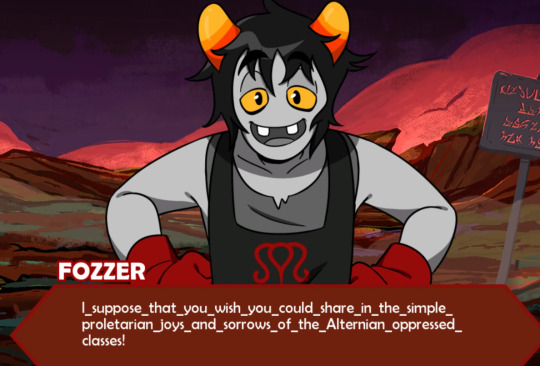
In the same way, Fozzer seems like an acutely intense expression of a political Persona. A philosophical idea, expressed in the physical world as an intense commitment to an associated identity. His shovel is an expression of that identity, much the same way Dirk’s katana or Nepeta’s claws are expressions of theirs.
But then again, Fozzer’s identity ain’t exactly stable, is it?
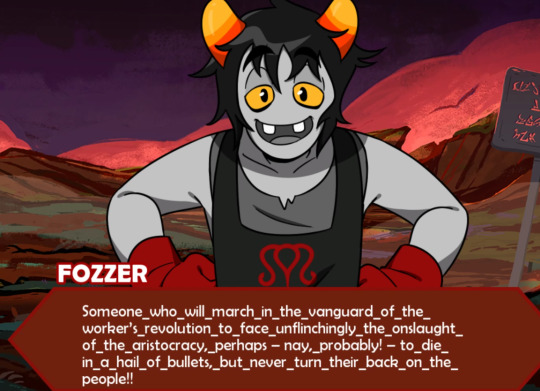
Before we talk about The Thing That Happens, we should note that as much as Fozzer seems to genuinely believe in his communist philosophy, he mostly seems interested in it as a means for self-expression, rather than an actual political movement with direct goals and results he’s looking to achieve.
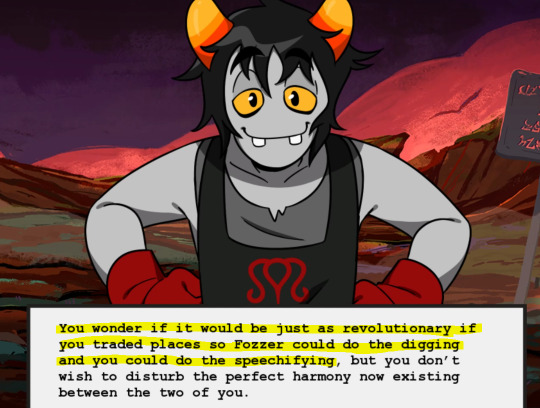
And even though he’s very intense and earnest about it, Fozzer seems inclined to exploit his own identity in somewhat self-serving ways. Unintentionally or no, he more or less uses his ideological speechifying to conscript the Reader into doing work for him, therefore inviting the reader to Serve him through Heart, for Fozzer’s own benefit.

This, coupled with his strongly noted cowardice, leads me to consider him a Page. But my real point here is that even if a lot of us here on Tumblr find Fozzer’s ideology appealing, Fozzer seems less invested in ideology proper than with the identity it comes with--and even here, Fozzer isn’t exactly being portrayed as unambiguously Good and Correct.
Even if he’s preferable to the alternative. Sigh.
Let’s talk about the thing.

[WORLDBUILDING INTERMISSION]
So the biggest surprise of this friendsim was that we stumbled onto what’s basically a swell of Scratch energy just...hanging out under Absence Park, apparently?
Which is. A lot. This energy resets our conversation with Fozzer and changes his personality, which we’ll get into in a minute, but first I want to speculate:
How the hell does this thing exist at all, and what does it even mean? There’s a couple of possibilities.
Since this is essentially Time-coded Scratch energy we’re dealing with, @blindrapture pointed out that it could have something to do with the Handmaid, which I’d expand to include Lord English--and though I doubt it’s directly linked to Scratch himself, since he’s not too associated with Time the way the former two are, he may be aware of or able to use this...”glitch” in reality.
It’s also possible this is a natural consequence of a Scratch, and pockets of leftover Scratch energy like these are present in some locations of Post-Scratch worlds. For that matter, it could be a consequence of John’s retcon powers, which act like the scratch in some ways and might have had consequences we don’t yet fully understand.

Finally, given the language, I suspect that the hole in Absence Park is actually just a hole into the Void, leading to the Furthest Ring, much like Roxy’s windows. This Scratch energy seems to have entered the Furthest Ring, and is presumably writhing there until circumstances allow it to vent out through this particular entrance to reality.
What are the implications? Who knows. If this is a hole into the Void, then this is another avenue through which Hiveswap’s cast might be able to exit Alternia and find a new world.
If the Scratch outbursts are recurring enough, then we have at least one way for our heroes to “Time Travel” and basically save scum to try and achieve optimal desires results, like saving a troll friend who gets killed by going back in time for example.
That’s probably the biggest takeaway to me, because having a way to time travel built into Hiveswap’s text already makes me that much more sure that no matter what kind of carnage and brutality our beloved troll friends get subjected to, we’re ultimately headed towards a happy ending where probably nobody dies--
I can reasonably see the possibility that even antagonistic figures like Ardata and even Trizza could be saved, under these circumstances.
Ok back to Fozzer.
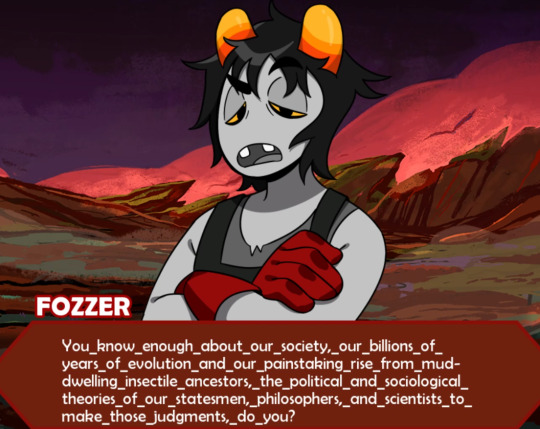
So the thing about “Post-Scratch” Fozzer is that I feel he’s being dismissed somewhat due to his admittedly unsavory politics. This still strikes me as a very genuine and direct expression of Fozzer’s Classpect inclinations.
Fozzer is still taking a very materialist view of reality here, for example--he’s interested in the actual physical history of how this system evolved, and considers understanding that history necessary to understanding society.
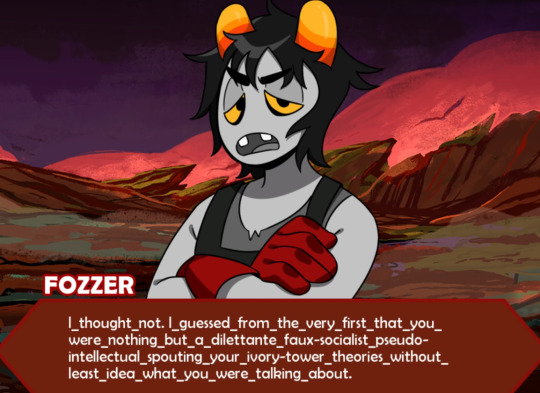
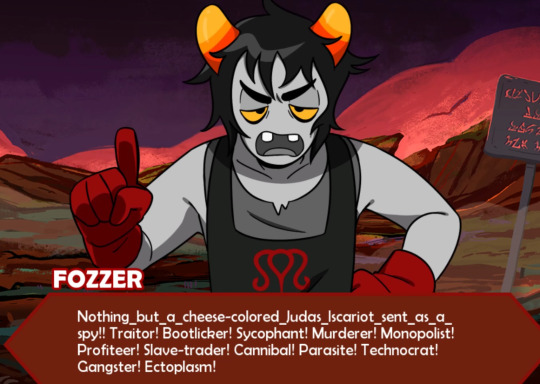
And however he disagrees with you, his instinctual response is the same. He storms off after verbally thrashing the Reader, but its interesting that he does it the same way both times: By imposing identities onto the Reader. Hilariously, Fozzer is unwittingly owning alternate versions of himself, too, and unwittingly inviting self-owns is basically the core of the Knight/Page aesthetic.
So really, Fozzer’s core personality is much the same--what’s taken place is a binary flip in the persona he relates to the world with. In one reality, he conveys the ideas of the hopeful revolutionary underclass.
In the other, he projects the identity of a happy and willing member for the Empire’s war-machine--the joyful slave, the pain of his own exploitation cushioned by a strong sense of societal purpose and identity. Note how the shovel easily parses as a strong symbol of this identity, too--a triumphant tool with which to serve the empire, rather than an ironic symbol of oppression.
I don’t think we should be hasty in assuming one Fozzer is more real than the other, even if we’re inclined to like one of them more. Especially since Fozzer works in Absence Park and seems familiar with these lights, meaning these scratch shifts might have been happening to him for a while.
The two Fozzers give us a fascinating window into the nuances of Heart, and indeed we’ve been told this sort of splintering of self can be common to the Heartbound by Calliope. Their opposing ideologies present us with a self-contained dialectic, in fact.
A dialectic at its core is a search for truth carried out by contrasting and comparing two diametrically opposed ideas, which in Hegel’s dialetic at least are defined as the Thesis and Anti-Thesis, respectively.
In Hegel’s understanding of the term, we can only truly understand an individual idea (say: Fozzer) by examining the tensions and similarities between these two opposed perspectives.
And these tensions are usually resolved not by one winning out over the other, but by achieving a Synthesis that combines he best traits of both.
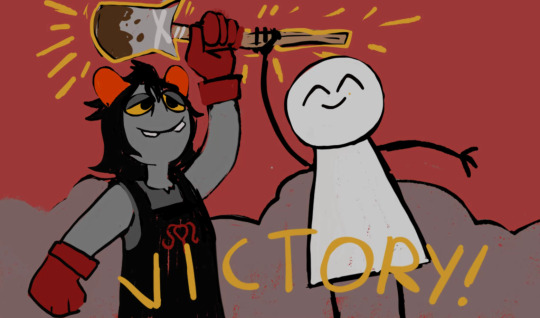
Maybe because of that, I find the fact that we can only “win” by embracing the “Happy Slave” Fozzer unnerving. It’s hard to say how Fozzer’s path will evolve going forward, but given how central the idea of conflicting opposites is to his expression of his Classpect, I highly doubt we’ve seen the last of “Comrade” Fozzer.
So, I guess we’ll just have to see how it goes?
[Closing disclaimer: I’m not entirely sure how different Marxism’s Dialectic Materialist approach is from Hegel’s Dialectics. For instance, I’m unsure if it also uses the “Thesis”, “Anti-Thesis”, “Synthesis” model Hegel describes, or if I’m accidentally mixing the two.
@gamblignant8 on the Perfectly Generic Podcast described Dialectic Materialism as being Hegel’s Dialectic applied with a focus on physical reality, mixed with an analysis of humanity’s historical evolution on the physical plain.
Cursory Wikipedia research seems to bear this out, with Marx even describing Dialectic Materialism as simply the opposite of Hegel’s more philosophical and idealistic take on the idea, which Marx regarded as full of “Mysticism”. As a Hopebound more comfortable with the ideal than the material myself, I suppose its no surprise I find Hegel’s dialectics more immediately approachable and comfortable, for now.
What I’m saying here is, take everything I’ve written about dialectic materialism here with a grain of salt: I’m trying to do my homework and make sure I have the facts straight, but it turns out philosophy can get hard to sum up, especially when you’re trying to reconcile it with a fantasy metaphysics system. Feel free to clarify if I’ve messed details up. ]
#Homestuck#fozzer velyes#fozzer#Hiveswap#Hiveswap Friendsim#My MSPA Analysis#Gnosticism#Heart#Light#Persona#Dialectics#Dialectic Materialism
216 notes
·
View notes
Link
(via Who the Fuck is Jacques Ranciere? | Critical-Theory.com)
WHO THE FUCK IS JACQUES RANCIERE?
A French critical theorist and philosophical troll in a world of ivory tower intellectualism, bourgeois academics, and Jean Baudrillard, Ranciere stands out as a kind of anti-philosopher. A University of Paris professor and former student of Louis Althusser, Ranciere has committed his intellectual project to destroying its foundations.
While that may sound a lot like Baudrillard, who wants to remind everyone that everything is simulation and nothing matters, or Nietzsche who attacks the foundations of Western metaphysics, Ranciere takes a different approach. Namely, by accusing every other philosopher of being a shitty Platonist and hating democracy.
While other philosophers deconstruct the metaphysical tradition and replace it with their own project, Ranciere’s philosophy can be summed up by “meh, people will figure it out.” And thus we present: the thought of Jacques Ranciere.
#1 “Fuck the Police” is Pretty Much his Definition of Politics

This counts.
In his “Ten Theses on Politics”, Ranciere makes a simple claim. There are two kinds of politics in the status quo, fake poser bullshit masquerading as politics and the real thing. Ranciere calls the poser politics the “politics of the police”. Ranciere calls “real” politics “dissensus.”
What the Fuck is Dissensus?
Dissensus is the process by which actors disrupt the politics of the police.
You see, the police are all about telling you what to do and where to do it. Remember that time that cop got all up in your grill for skateboarding in front of 7-11? Or, if you’re a person of color, remember that time a cop arrested you and planted drugs on you for skateboarding in front of 7-11? That’s the police order; the partitions that the police put in place for what can be seen, said and done, and where they can be done. When that cop drove away and you kept skateboarding, you totally disrupted the police partitioning of that space (sort of).
The police says that there is nothing to see on a road, that there is nothing to do but move along. It asserts that the space of circulating is nothing other than the space of circulation. Politics, in contrast, consists in transforming this space of ‘moving-along’ into a space for the appearance of a subject: i.e., the people, the workers, the citizens: It consists in refiguring the space, of what there is to do there, what is to be seen or named therein. It is the established litigation of the perceptible. – Ten Theses on Politics
We can see how these police partitions work in the events of Occupy Wall Street.
You see, some bankers made this park on stolen native land for them to eat lunch in while they rested from robbing the world of millions of dollars with complicated derivatives and other bullshit nobody understands. When some hipsters decided they wanted to camp out on Wall Street, the police were like “GTFO bro”. And when those hipsters started camping out in Zuccoti Park and ruining those bankers lunches, the police calmly reminded the protesters that the park belonged to white people in suits. The police reminded the protesters that if they want to take part in this “politics” business they need to vote like everyone else, or at least have some sort of “concrete demands”. But they didn’t, so then they started pepper spraying kids.
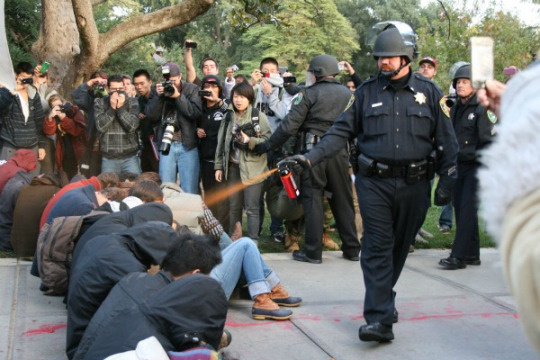
That’s what the police order does, it tells you to take part in the fake politics – casting a ballot, going to a town hall – and tries to divest energy from what Ranciere calls real politics. After all, the Egyptian revolution didn’t start because people started sending nicely worded petitions to the government. It started when people manifested themselves in the public spaces that were once apolitical.
#2 He Doesn’t Get Along with his Colleagues
Ranciere got his first exposure by contributing to Reading Capital with his teacher Louis Althusser.
//////
https://www.wikiwand.com/fr/Lire_le_Capital
Dialectical materialism is a philosophy of science and nature developed in Europe and based on the writings of Karl Marx and Friedrich Engels. In contrast to the Hegelian dialectic, which emphasized the idealist observation that human experience is dependent on the mind's perceptions, Marxist dialectics emphasizes the importance of real world conditions, in terms of class, labor, and socioeconomic interactions.
-
Historical materialism, also known as the materialist conception of history, is a methodology used by some communist and Marxist historiographers that focuses on human societies and their development through history, arguing that history is the result of material conditions rather than ideas. This was first articulated by Karl Marx (1818–1883) as the "materialist conception of history." I
///////
It may be surprising that a few years later Ranciere put out Althusser’s Lesson which might have well been a raging “fuck off” to his teacher and mentor. The quarrel started over the events of May ’68. While Althusser and other Marxists were asserting the importance of Marxist academia in the French student revolts, Ranciere began to break away from this traditional mode of thought. Marxist intellectuals accused the revolts of being bourgeois and undisciplined. To which Ranciere accused Marxists of being a bunch of little shits:
The underlying idea, to focus solely on the theoretical level, is not only that Marxism is learned exclusively through books, but also that it is learned only from the classics. It is that every development is a betrayal, that every application of Marxism is a deviation into pragmatism, ideology, and political manipulation. We can see quite clearly from the phrase, ‘to focus solely on the theoretical level’, that what was at stake on the practical level was the rejection of the ‘developments’ that Khrushchev, with his successors and emulators, had introduced to ‘classical’ Marxism. This was the time, for example, when it was common to teach that peaceful coexistence was the supreme form of class struggle . . . The purism of theory could not but have political effects. And that was really all that mattered: we could say everything, provided nothing that we said had practical effects. – Althusser’s Lesson
But that was just the start. Ranciere’s project became more and more defined as time went on. From a criticism of Althusser and orthodox Marxism, Ranciere’s message soon became “Philosophy – it’s a big bag of dicks.” Writing Hatred of Democracy, Ranciere attacks the Platonic tradition and ties it to practically every Marxist philosopher. He argues that everyone in the Western tradition, from Plato to Marx, wants to become a philosopher king to shovel Truth into the mouths of the blind ignorant masses. Ranciere carries this line of thought to his other books such as “Disagreement” where he accuses every theorists of democracy of being a Platonic saboteur.
One of his most famous feuds is with fellow Althusser alumn Alain Badiou for his self-professed Platonism.
Badiou, whose goal is to revive an “egalitarian Platonism,” penned an essay about Ranciere titled “The Lessons of Jacques Ranciere: Knowledge and Power After the Storm,” whereby Badiou acknowledges that the shittiest thing he could ever to do Ranciere is agree with him:
“To speak only well of Jacques Ranciere is not an easy task, given the positions that the two of us occupy. Perhaps my constant praise might, in fact, be the worst fate that I could have in store for him. Would doing so be precisely the most underhanded way to attack him? If, for example, I were to announce that we are in agreement on a number of important points, how would he take that? Would he rather just as soon change his mind on all those points and leave me behind?” – Jacques Ranciere: History, Politics, Aesthetics
And then there’s Jean Baudrillard. Baudrillard, who started his career by telling everybody to “Forget Foucault” is an academic troll par excellence. The theorists of simulation has taken Guy Debord’s Society of the Spectacle and turned it into a nihilistic portrait of doom and despair. But Ranciere ain’t got time for that. Writing in “The Misadventures of Critical Thought” he says “theorists of simulation” (a not-so-subtle reference to Baudrillard) are at the heart of simulation itself.
The Marxism of the denunciation of the mythologies of the commodity, the fallacies of consumer’s society and the empire of the spectacle. Forty years ago, it was supposed to unmask the machineries of domination, in order to provide the anti-capitalist fighters with new weapons. It has turned to exactly the contrary: a form of nihilist knowledge of the reign of the commodity and the spectacle, of the equivalence of anything with anything and of anything with its image
…The current disconnection between the critical procedures and any perspective of emancipation only reveals the disjunction at the heart of the critical paradigm. It may make fun of its illusions but it remains enclosed in its logic. This is why I think it is necessary to re-examine the genealogy of the concepts and procedures of that logic and the way in which it got intertwined with the logic of social emancipation.
– The Misadventures of Critical Thought
#3 He Thinks Your Professor is Worthless
It might seem ironic for a teacher to conclude “fuck smart people.” But in The Ignorant Schoolmaster, Ranciere makes that very claim. You see, Ranciere has been hating on philosophers from the very beginning. From his very start in Althusser’s Lesson, to Hatred of Democracy, to The Philosopher and his Poor, Ranciere is constantly accusing philosophers of proposing a capital T truth to reign down in a golden shower of truth onto ignorant masses. That makes a really compelling case for why I shouldn’t be reading Ranciere at all, and maybe just fucking up the police on my own terms.
But in The Ignorant Schoolmaster, Ranciere takes teachers to task. You see, teachers are trying to make you stupid. Really stupid. Like you would be better off thinking about shit really hard instead of taking a class on something. Why does he say that?
There was this dude named Jacotot, and he was awesome. He was a French guy who went to teach in Belgium after the French Revolution. He was teaching French, but his students only spoke Flemish. He, by the way, did not speak Flemish. So doing what any responsible teacher would do, Jacotot gave them a recent version of this book Telamaque that had the French on one side of the page and the Flemish on the other side and said “figure it out.”
And they did.
Ranciere advocates this form of “universal education” and says the traditional teacher/student model is only meant to perpetuate societal inequality and keep students in a state of stultification. Stultification – that’s a fancy word for stupid. The implications of this philosophy are A) You don’t need a teacher like Ranciere to teach you anything and B) An illiterate parent could teach their children to read by plopping a book down and saying “figure it out.”
The crazy part? This shit works, and not just around random corners of Europe where the tradition was born.
You know how your dumb ass can barely figure out how to change the settings on your Kindle? Remember that fancy college degree you spent more than $100k on? Well fuck you, because kids in Ethiopa who don’t even know what a tablet is can not only fix your settings but remove any pesky security measures while they’re at it.
You see, someone at One Laptop Per Child had the bright idea of just dumping a bunch of Motorola Zoom tablets in an Ethiopan village full of kids. The children did not speak English, which was the language loaded on the tablet, and they had never seen a computer before. Within weeks these kids were fucking wizards with the things so much so that they actually figured out how to jailbreak them.
“We left the boxes in the village. Closed. Taped shut. No instruction, no human being. I thought, the kids will play with the boxes! Within four minutes, one kid not only opened the box, but found the on/off switch. He’d never seen an on/off switch. He powered it up. Within five days, they were using 47 apps per child per day. Within two weeks, they were singing ABC songs [in English] in the village. And within five months, they had hacked Android. Some idiot in our organization or in the Media Lab had disabled the camera! And they figured out it had a camera, and they hacked Android.”
There’s more. These other researchers decided to give this whole universal education thing a shot and gave a bunch of molecular biology textbooks to a bunch of Tamil-speaking kids in South India. The text books were in English.
Left on their own for two months, without external help or instruction, the researchers felt that surely this task would demonstrate that ‘yes, we need teachers for certain things’ (Mitra 2010). Indeed, after two months, when Mitra asked them what they understood of molecular biology, the children confirmed that they understood nothing. What gets the biggest laugh at Mitra’s numerous talks, however, is the response of one girl from the group, who explained: ‘Apart from the fact that improper replication of the DNA molecule causes genetic disease, we understood nothing else.’ – Of Slumdogs and Schoolmasters – Jacotot, Ranciere and Mitra on Self-Organized Learning
When given an exam on the material, however, the kids all failed. And by failed, they averaged 30%, which is exactly 4 points lower than I scored on my high school physics final that was administered in a language I speak.
Want to Learn More About Ranciere?
If you’d like to explore the thought of Jacques Ranciere, you can read his Ten Theses on Politics for free on Scribd. You should also check out this Ranciere blog, run by Paul Bowman and Michael O’Rourke.Paul Bowman, by the way, is really into writing about the intersections of Bruce Lee and Ranciere.
0 notes